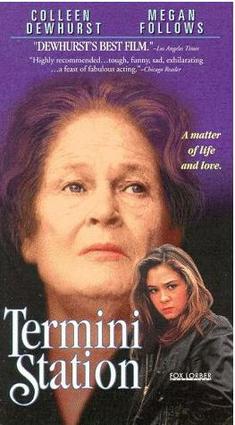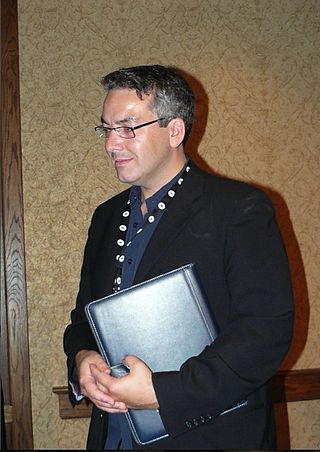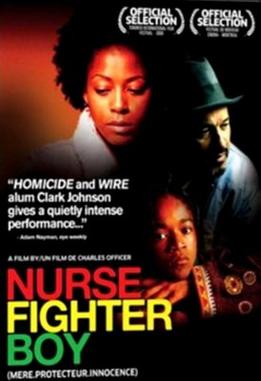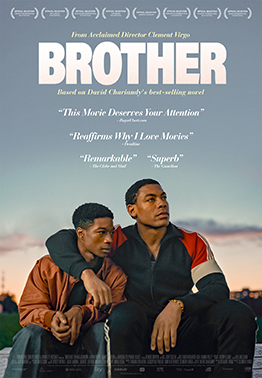
Atom Egoyan is a Canadian filmmaker. Emerging in the 1980s as part of the Toronto New Wave, he made his career breakthrough with Exotica (1994), a film set in a strip club. Egoyan's most critically acclaimed film is the drama The Sweet Hereafter (1997), for which he received two Academy Award nominations. His biggest commercial success is the erotic thriller Chloe (2009).
Nothing Too Good for a Cowboy is a Canadian television drama series, which aired on CBC from 1998 to 2000. The series, which is set in the 1940s, was based on the memoirs of author and rancher Richmond P. Hobson, Jr. and set on a ranch in rural northern British Columbia.

Termini Station is a 1989 Canadian drama film directed by Allan King and written by Colleen Murphy.
The Academy of Canadian Cinema and Television presents an annual award for Best Motion Picture to the best Canadian film of the year.

Rare Birds is a 2001 Canadian comedy-drama film, directed by Sturla Gunnarsson and written by Edward Riche based on his novel.

The Five Senses is a 1999 Canadian drama film directed, written and produced by Jeremy Podeswa.
The Academy of Canadian Cinema and Television presents an annual award for Best Achievement in Cinematography, to honour the best Canadian film cinematography.
The Canadian Screen Award for Best Achievement in Sound Editing is awarded by the Academy of Canadian Cinema and Television to the best sound editor on a Canadian film. The award was first presented in 1970 as part of the Canadian Film Awards, before being transitioned to the new Genie Awards in 1980; since 2013 it has been presented as part of the Canadian Screen Awards.
The Canadian Screen Award for Best Live Action Short Drama is awarded by the Academy of Canadian Cinema and Television to the best Canadian live action short film. Formerly part of the Genie Awards, since 2012 it has been presented as part of the Canadian Screen Awards.

Mark Ellis is a Canadian actor and screenwriter. He was the co-showrunner and executive producer of the CBC series X Company.

Nurse.Fighter.Boy is a 2008 Canadian drama film, directed by Charles Officer. The film stars Karen LeBlanc as Jude, a widowed single mother undergoing treatment for sickle cell disease. While working as a night-shift nurse to support her son Ciel, she meets and enters into a relationship with Silence, a troubled and brooding boxer who becomes a father figure for the young boy.
Leonard Farlinger is a Canadian film director, producer, and screenwriter. Farlinger and his wife, Jennifer Jonas, are partners in the production firm New Real Films.
Surfacing is a 1981 Canadian drama film directed by Claude Jutra and starring Kathleen Beller, R. H. Thomson, Joseph Bottoms, Michael Ironside and Margaret Dragu. The film was written by Bernard Gordon as an adaptation of Margaret Atwood's novel Surfacing (1972).
Looking for Leonard is a Canadian crime comedy-drama film, directed by Matt Bissonnette and Steven Clark and released in 2002.
Mile Zero is a Canadian drama film, directed by Andrew Currie and released in 2001. The film stars Michael Riley as Derek Ridley, a divorced father who abducts his son Will after his ex-wife Allison tries to limit his contact. Currie's intention for the film was to present a nuanced understanding of the emotional vulnerability that might lead a father to act in this manner, neither demonizing him as a mainstream Hollywood film would likely have done nor portraying him as a hero; it was inspired in part by Currie's own emotions about having to spend a year away from his son while studying at the Canadian Film Centre.
The World Is Watching is a Canadian short documentary film, directed by Peter Raymont and released in 1988. The film examines media coverage of the Nicaraguan Revolution through the lens of an ABC News crew on the ground in the country, documenting the various production pressures and limitations that can hamper the efforts of journalists to fully and accurately report a story; its thesis hinges in part on the fact that Nicaraguan president Daniel Ortega's key announcement that he would negotiate with the Contras was made only after the network's news production deadline for the day, leaving the network's initial reports on ABC World News Tonight able to report that he had made a speech but almost completely unable to say anything informative about it.
Lunch with Charles is a romantic comedy-drama film, directed by Michael Parker and released in 2001. A coproduction of companies from Canada and Hong Kong, the film stars Sean Lau as Tong, a Hong Kong musician and businessman who has been living apart from his wife April for three years due to his reluctance to join her when her career in public relations took her to Vancouver.
Colin Browne is a Canadian writer, documentary filmmaker and academic. He is most noted for his documentary film White Lake, which was a Genie Award nominee for Best Feature Length Documentary at the 11th Genie Awards in 1990, and his poetry collection Ground Water, which was shortlisted for the Governor General's Award for English-language poetry at the 2002 Governor General's Awards.

Brother is a 2022 Canadian drama film, written, produced and directed by Clement Virgo. An adaptation of David Chariandy's award-winning novel of the same name, the film centres on the relationship between Francis and Michael, two Black Canadian brothers growing up in the Scarborough district of Toronto, Ontario in the early 1990s.
The Hidden Fortress is a Canadian children's comedy film, directed by Roger Cantin and released in 2001. Part of Rock Demers's Tales for All series of children's films, the film centres on two groups of rival children playing war games while spending summer vacation with their families at cottages on a lake, which are complicated when the leader of the losing team resorts to detaining prisoners of war in a desperate attempt to win the game.







